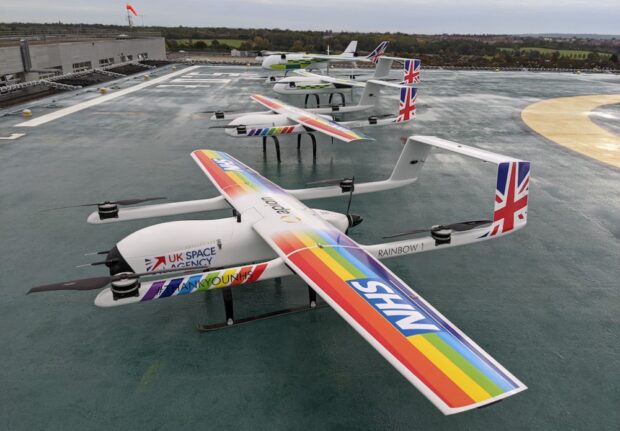NHS cancer patients will be the first in the world to benefit from chemotherapy delivered by drone as part of a new trial, NHS chief executive Amanda Pritchard announced. The drones, set to make their first flight in the coming weeks, will mean that the lifesaving treatment can be picked up and dropped to patients on the same day.
Announcing the major trial on the NHS’s 74 birthday, NHS chief executive Amanda Pritchard said the drone deliveries were just the latest “extraordinary” instalment in another year that has showcased NHS innovation and cutting-edge technology.
In a first of its kind trial, starting on the Isle of Wight, chemo will be flown directly from the pharmacy at Portsmouth Hospitals University NHS Trust to St Mary’s Hospital, where staff will collect it before distributing it to hospital teams and patients.
What route will the drone take?
The CAA has approved a route between Portsmouth Queen Alexandra (QA) hospital’s helipad to Baker Barracks on Thorney Island to St Mary’s Hospital (SM) helipad on the Isle of Wight. The flightpath has been designed to minimise impact on other stakeholders within the region such as residents, Chichester Harbour’s Site of Special Scientific Interest (SSSI), maritime activity and other aviation. The drone is flown in a segment of airspace the upper limits of which are 850ft.
Chemotherapy is difficult to transport as some doses have a short shelf life so the NHS has partnered with tech company Apian to come up with a new way of getting the treatment to patients in record time.
Drones will cut the usual delivery time from four hours to 30 minutes, saving fuel and money and making cancer care much more convenient for patients living on the Isle of Wight who often need to travel to the mainland for treatment at the moment.
Each drone delivery replaces at least two car journeys and one hovercraft or ferry journey per delivery – saving carbon emissions and contributing to improving air quality for patients and the community.
It will also help the NHS become the first health system in the world to become carbon neutral.
The drone programme will be trialled initially in the Isle of Wight followed by Northumbria and could allow clinicians to make “same-day orders” for vital medical equipment and other treatments.
NHS chief executive Amanda Pritchard said:
“Delivering chemo by drone is another extraordinary development for cancer patients and shows how the NHS will stop at nothing to ensure people get the treatment they need as promptly as possible – while also cutting costs and carbon emissions.
“From a smartwatch to manage Parkinson’s to revolutionary prostate treatments and making the most expensive drug in the world available to NHS patients, it has been another amazing year of innovation in the way the health service delivers treatment and care.
“As the NHS turns 74 it is clear that the pace of change and improvement across the health service is only accelerating as our fantastic staff seek to make the most of life-changing advances to improve patients lives as we promised in the NHS Long Term Plan”.
Health and Social Care Secretary Sajid Javid said
:
“I want England to become a world leader in cancer care and using the latest technology to deliver chemo by drone means patients will have quicker, fairer access to treatment no matter where they live.
“As the NHS turns 74, innovations like this will help improve patients’ access to lifesaving care while ensuring the NHS is making the best use of the record funding we’re investing to bust the COVID backlogs.
“Our upcoming 10-Year Cancer Plan will set out a vision for how we will speed up diagnosis, roll-out innovative new treatments and revolutionise cancer services across the country”.
The NHS Long Term Plan committed to deploying the latest cutting-edge technologies while rolling out new innovations and treatments to patients across the country.
Talking about how the chemo drone will be able to support services in the Isle of Wight, the Isle of Wight NHS Trust CEO Darren Cattell said:
“The Island has a long history of innovation. We are excited to continue that tradition by utilising the latest technology to overcome the challenges we face and to provide the very best service to our patients.
“We are still at a relatively early stage but the use of drones to transport medical supplies is a concept that has radical and positive implications for both the NHS and for patients across the UK as well as the Isle of Wight. It is great to be part of this innovative project”.
Apian CEO, Alexander Trewby said:
“My mother worked for the NHS in Portsmouth her entire life before she passed away from cancer three years ago.
“This project marks a very important first step in the construction of a network of drone corridors connecting hospitals, pathology labs, GP surgeries, care homes and pharmacies up and down the country so that in the future, everyone’s mother will benefit from the delivery of faster, smarter and greener healthcare”.
The trial is a joint effort between Isle of Wight NHS Trust, Portsmouth Hospitals University NHS Trust, Solent Transport, University of Southampton, King’s College London, Skylift, Modini, the Ministry of Defence, UKRI and Apian.
Matt Whitty, Chief Executive of the Accelerated Access Collaborative and Director for Innovation, Research and Life Sciences at NHS England, said:
“It’s a pleasure to see an innovation that began as an idea from talented NHS staff become a reality with such huge potential, and all with the support of our Accelerated Access Collaborative programmes.
“Apian was supported by the NHS Clinical Entrepreneur Programme (CEP) which provides support to entrepreneurial NHS staff helping nurture innovation within the NHS and then they received funding support from our Small Business Research Initiative Healthcare Awards. The first-ever drone delivery of chemotherapy will show the very best of the impact that innovation can have on patient care as well as contributing to supporting the NHS’s net-zero goals”.
Source: Press Release


